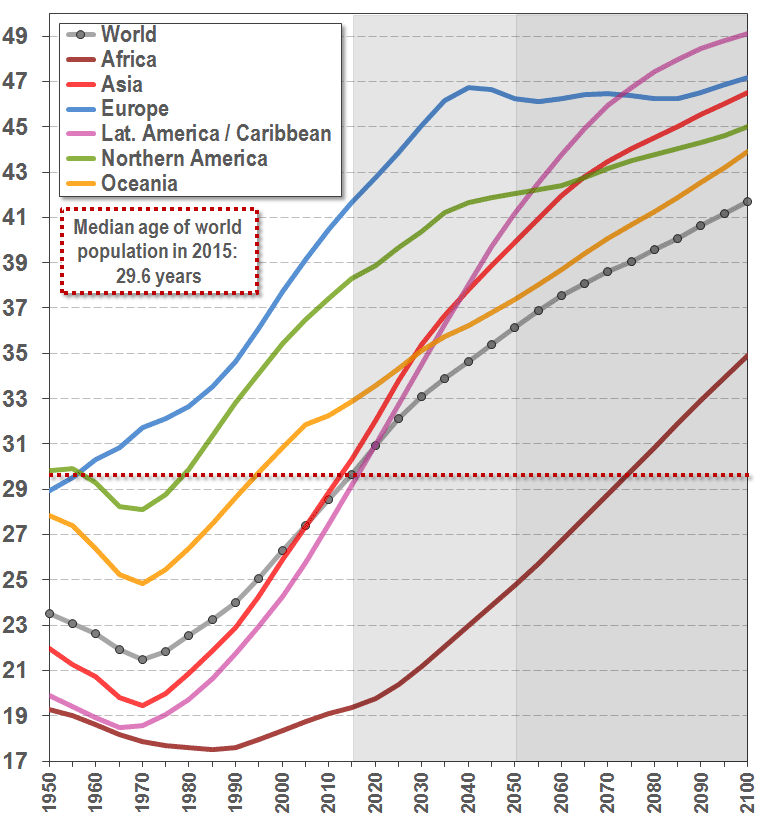
The most obvious consequence is certainly the challenge for the pension system. Particularly public "pay-as-you-go" pension systems, where the retired are supported by their working-age children, can easily tumble into financial difficulties. But also systems that depend on savings or family-related support can get into troubles with a declining number of younger people. With a shrinking working-age population economic growth may decline und thus savings may be devaluated. Und fewer children will have difficulties to take care for their old parents - especially in countries such as China where children have often moved away to highly developed parts of the country.
Slower economic growth. With population aging, which is typically the consequence of a rapid decline in the number of births, we usually also have a decline in population growth - or even a population decline. This immediately lowers overall demand and thus may lead to slower economic growth or economic stagnation and decline.
Poverty and deprivation among the elderly. With declining pensions and fewer children, older people can easily end up in precarious situations. Relative poverty among the elderly can emerge with population ageing even in highly developed countries. We can already observe such situations in Southern Europe where many older people are currently experiencing a decline in their economic situation. The most serious problem, however, is not economical. Social deprivation and neglect of older people is quite common in rapidly ageing peopulations. In some (rural) parts of Japan suicide rates among older people are skyrocking.
Generational redistibution of wealth. Population ageing is often followed by a significant re-distribution of wealth between generations. With a shrinking number of children each family's wealth is distributed among a smaller number of heirs. Private wealth will thus become more concentrated, as large generations of older people bequest their estates to a smaller number of younger people. In fact, the inherited concentration of private wealth in aging societies may contribute to the increasingly uneven distribution of wealth.
Decline of creativity and innovation and a decline in human capital. As the share of young people declines in a society, the speed of social, cultural and scientific innovation may slow down. Even with higher healthy life expectancy, older people are usually more risk-adverse than younger people. They are less creative in exploring new ways and more dependend on experience.
Labor shortages and inefficiency in labor markets. In most cases, population ageing will cause a subsequent shortage of labor - as we can now observe even in populous countries such as China or Japan. The economy, which has been growing in the past with population growth, is suddenly confronted with a shirinking number of young people entering the labor market. Therefore, the economy has to adjust not only to a slower overall demand, but also to a lower labor supply. Human capital can get relatively scarce during a phase of population ageing.
A decline in consumer demand and changing consumption patterns. There is a clear age-dependency of consumption. Older people have much higher consumption of health-related products and services, but much lower demand in durable goods, such as household appliences, cars, or real estate. With populous countries, such as China, this will affect not only domestic industries and service sectors, but also the international markets.
Aging societies tend to be politically more conservative. Rapid political change and revolutions are rare among aging societies. The majority of older people prefers more conservative policies. This is most obvious in Japan and Germany, where the political systems have been dominated for decades by conservative or at least traditional social-democratic parties.
Park, Donghyun and Kwanho Shin. 2011. Impact of Population Aging on Asia’s Future Growth. Asian Development Bank, ADB Economics Working Paper Series, 281. Paper prepared as a background material for the Asian Development Outlook 2011 Update.
Bloom, D., D. Canning, and G. Fink. 2011. Implications of Population Aging for Economic Growth. NBER Working Paper No. 16705, National Bureau of Economic Research, Massachusetts.
Gomez, R., and P. Hernandez de Cos. 2008. Does Population Ageing Promote Faster Economic Growth? Review of Income and Wealth 54(3):350–72.
Tang, J., and C. MacLeod. 2006. Labor Force Ageing and Productivity Performance in Canada. Canadian Journal of Economics 39(2):582–603.
